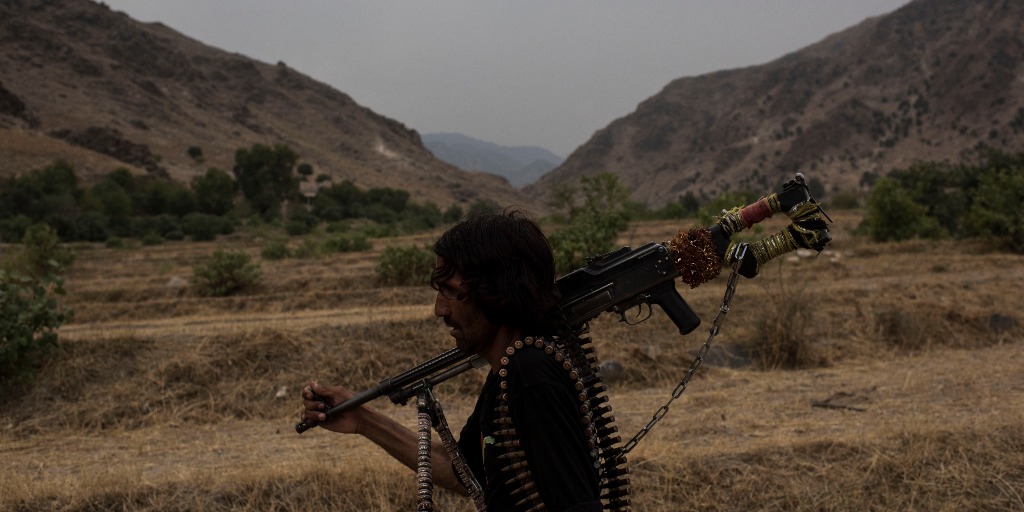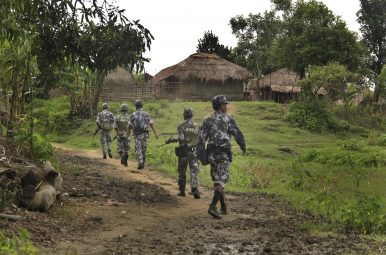by R Jagannathan
10 January 2018
Government Mustn’t Be In Denial Over Aadhaar Security; It Is Real, But Largely Fixable
India’s First Nuclear-Powered Missile Submarine Has Been Out of Action for 10 Months
Dave Majumdar
An Ominous New Year for India
Mihir Sharma
 You’d think the Indian economy had returned to rosy health. It seems to have recovered from two enormous disruptions -- Prime Minister Narendra Modi’s decision just over a year ago to withdraw 86 percent of the currency in circulation, and the poorly-planned rollout in the middle of 2017 of a new goods-and-services tax. Exports are no longer declining, as they had for several quarters; indeed, for the last month that data is available, they rose 30 percent. The Purchasing Managers’ Index expanded the fastest it has in five years. At least one international ratings agency has upgraded India’s credit rating.
You’d think the Indian economy had returned to rosy health. It seems to have recovered from two enormous disruptions -- Prime Minister Narendra Modi’s decision just over a year ago to withdraw 86 percent of the currency in circulation, and the poorly-planned rollout in the middle of 2017 of a new goods-and-services tax. Exports are no longer declining, as they had for several quarters; indeed, for the last month that data is available, they rose 30 percent. The Purchasing Managers’ Index expanded the fastest it has in five years. At least one international ratings agency has upgraded India’s credit rating.'US wants Haqqanis, not Saeed'
'Perhaps the biggest indication was its striking decision in November to delink LeT from its aid certification process.' 'The administration decided that the US, in order to send military aid to Pakistan, would not need to certify that Pakistan is cracking down on LeT.' 'Perhaps the administration was trying to offer a carrot -- in effect, we're backing off on LeT, but in return we expect you (Pakistan) to go after the Haqqanis.' 'Either way, the optics were dreadful for the US given that Hafiz Saeed was released from house arrest a few days after the US move.' The US reacted angrily, but eventually it moved on, and refocused on its core concern: The Afghan-focused terror groups.'
The Illusion of Strategy in Afghanistan: No Change in Pakistan’s Malice
By Robert M. Cassidy,
 Pakistan’s machinations and America’s past delusions pose obstacles to a successful strategic outcome for the war In Afghanistan. Pakistan’s machinations and America’s past delusions pose obstacles to a successful strategic outcome for the war In Afghanistan. The US and its Coalition partners have been at war in Afghanistan for six years longer than the Soviets were at war in Afghanistan. The Pakistani Army and its Inter Services Intelligence Directorate continue to collude with the Taliban, preventing their defeat. After the 9/11 attacks, it should have become absolutely clear that Pakistan’s sponsorship of foreign terrorist organizations made it an enemy. The relations between the US and Pakistan constitute a saga of false promises, mismanaged expectations and disastrous betrayals.
Pakistan’s machinations and America’s past delusions pose obstacles to a successful strategic outcome for the war In Afghanistan. Pakistan’s machinations and America’s past delusions pose obstacles to a successful strategic outcome for the war In Afghanistan. The US and its Coalition partners have been at war in Afghanistan for six years longer than the Soviets were at war in Afghanistan. The Pakistani Army and its Inter Services Intelligence Directorate continue to collude with the Taliban, preventing their defeat. After the 9/11 attacks, it should have become absolutely clear that Pakistan’s sponsorship of foreign terrorist organizations made it an enemy. The relations between the US and Pakistan constitute a saga of false promises, mismanaged expectations and disastrous betrayals.The End of the US-Pakistan Alliance
By George Friedman
The U.S.-Pakistan alliance is over. The Pakistani foreign minister said as much during a recent interview with The Wall Street Journal, a statement made in response to the announcement that the U.S. would cut off all aid to Pakistan for its failure to suppress jihadists in Afghanistan and, according to some, for its role in aiding them. There is reason to believe the statement is not just politics as usual. The interests of Pakistan and the U.S. are profoundly different, and though it is possible for them to reconcile them, it is unlikely.
The war against Islamic State will be won — or lost — on the cyber battlefield
Matthew R. A. Heiman
President Trump and Secretary of Defense James N. Mattis should be congratulated for contributing to the steady decline of Islamic State’s territorial claims.Several years ago, in October 2014, Islamic State controlled land from central Syria to the fringe of Baghdad — territory that included large key cities such as Mosul, Fallujah and Tikrit in Iraq and Raqqah in Syria. Today, it controls only a sparsely populated chunk of desert on both sides of the Iraq-Syria border. Its shrinking territory notwithstanding, Islamic State continues to fly a black flag of aggression rather than a white flag of surrender. It flies this flag most effectively online, using the internet to promote warped religious views, recruit fighters, inspire deadly acts of terrorism and encourage disruption and chaos.
Will Pakistan Close NATO’s Supply Routes into Afghanistan? Mattis Plays Down Possibility
BY MARCUS WEISGERBER
 ‘I’m not concerned,’ the defense secretary tells reporters after the White House announced an intention to suspend military aid to Islamabad. U.S. Defense Secretary Jim Mattis played down the prospect that Pakistan might close NATO’s supply routes into Afghanistan after the Trump administration said it would suspend military aid to Islamabad.Alliance forces rely on Pakistani roads to haul supplies to landlocked Afghanistan. Pakistan closed them once before, after a 2011 U.S. airstrike killed two dozen of its soldiers.“No, I’m not concerned,” Mattis told reporters on Friday at the Pentagon when asked about the prospect of Pakistan shutting down what the military calls Ground Lines of Communication, or GLOCs.
‘I’m not concerned,’ the defense secretary tells reporters after the White House announced an intention to suspend military aid to Islamabad. U.S. Defense Secretary Jim Mattis played down the prospect that Pakistan might close NATO’s supply routes into Afghanistan after the Trump administration said it would suspend military aid to Islamabad.Alliance forces rely on Pakistani roads to haul supplies to landlocked Afghanistan. Pakistan closed them once before, after a 2011 U.S. airstrike killed two dozen of its soldiers.“No, I’m not concerned,” Mattis told reporters on Friday at the Pentagon when asked about the prospect of Pakistan shutting down what the military calls Ground Lines of Communication, or GLOCs.Persistent, Expanding and Worrisome’: ISIS Rebounds in Afghanistan
BENNETT SEFTEL
 Bottom Line: With the original ISIS core nearly expelled from its so-called caliphate in Syria and Iraq, other ISIS branches are growing in influence and lethality. Skilled fighters and funding are flowing to ISIS Khorasan Province in Afghanistan where the group has taken advantage of the country’s weak central government and harsh geographic terrain to fend off invaders and exude a winning aura. U.S. and Afghan forces claim they have killed ISIS fighters by the thousands, but those numbers are being replenished by new militant recruits eager to join what they see as a “winning” team.
Bottom Line: With the original ISIS core nearly expelled from its so-called caliphate in Syria and Iraq, other ISIS branches are growing in influence and lethality. Skilled fighters and funding are flowing to ISIS Khorasan Province in Afghanistan where the group has taken advantage of the country’s weak central government and harsh geographic terrain to fend off invaders and exude a winning aura. U.S. and Afghan forces claim they have killed ISIS fighters by the thousands, but those numbers are being replenished by new militant recruits eager to join what they see as a “winning” team.Pakistan Tests An Indigenously Developed Anti-Ship Cruise Missile
By Ankit Panda
 Last week, the Pakistani Navy carried out the first-ever test launch of its Harbah anti-ship and land-attack cruise missile (LACM/ASCM). The test was carried out in the North Arabian Sea on January 3, according to a press release from Pakistan’s Inter-Services Public Relations (ISPR). “The successful live weapon firing has once again demonstrated the credible fire power of Pakistan Navy and the impeccable level of indigenization in high tech weaponry achieved by Pakistan’s defence industry,” ISPR noted in a statement. “The missile accurately hit its target signifying the impressive capabilities of Harbah Naval Weapon System.”
Last week, the Pakistani Navy carried out the first-ever test launch of its Harbah anti-ship and land-attack cruise missile (LACM/ASCM). The test was carried out in the North Arabian Sea on January 3, according to a press release from Pakistan’s Inter-Services Public Relations (ISPR). “The successful live weapon firing has once again demonstrated the credible fire power of Pakistan Navy and the impeccable level of indigenization in high tech weaponry achieved by Pakistan’s defence industry,” ISPR noted in a statement. “The missile accurately hit its target signifying the impressive capabilities of Harbah Naval Weapon System.”China-Myanmar Security Operation Spotlights Big Drug Challenge
By Prashanth Parameswaran
 Over the weekend, Chinese state media reported on the results of another recent joint drug operation that had been conducted between China and Myanmar. Though the operation is indicative of continued efforts by both sides to crack down on the problem, it also obscures the sheer magnitude of the problem and the limits of a focus on the punitive aspects of government responses. As I’ve written previously in these pages, the China-Myanmar border is a sensitive issue for both countries. Though both countries desire stability along their 2,200 kilometer border, which also hosts the border trade that is important to southwestern Yunnan province and Chinese nationals in Myanmar, it is also frequently plagued by conflict, drugs, and disease.
Over the weekend, Chinese state media reported on the results of another recent joint drug operation that had been conducted between China and Myanmar. Though the operation is indicative of continued efforts by both sides to crack down on the problem, it also obscures the sheer magnitude of the problem and the limits of a focus on the punitive aspects of government responses. As I’ve written previously in these pages, the China-Myanmar border is a sensitive issue for both countries. Though both countries desire stability along their 2,200 kilometer border, which also hosts the border trade that is important to southwestern Yunnan province and Chinese nationals in Myanmar, it is also frequently plagued by conflict, drugs, and disease.Taiwan isn’t China, and Taiwanese aren’t Chinese
By Jeff Jacoby
 THERE IS A moment in “1776,” the acclaimed musical about the American founding, in which Benjamin Franklin explains to the Continental Congress why he no longer thinks of himself as an Englishman. He is aggrieved that the colonists are denied the full rights of English citizens, but that isn’t the whole of it. “We’ve spawned a new race here — rougher, simpler, more violent, more enterprising, less refined,” Franklin says. “We’re a new nationality. We require a new nation.” I thought of that scene as I was having dinner recently with three students in Taipei. Celia Chung, Tony Chang, and Polly Cheng attend National Chengchi University, one of Taiwan’s leading institutions of higher education. I met them during a visit to Taiwan sponsored by the Association of Foreign Relations, a Taiwan-based NGO that promotes international awareness of the island’s affairs. After several days of hearing from middle-aged diplomats and civil servants, I had sought out a chance to talk with young people unconstrained by party line or official platitudes. I especially wanted to know what it meant to them to be Taiwanese.
THERE IS A moment in “1776,” the acclaimed musical about the American founding, in which Benjamin Franklin explains to the Continental Congress why he no longer thinks of himself as an Englishman. He is aggrieved that the colonists are denied the full rights of English citizens, but that isn’t the whole of it. “We’ve spawned a new race here — rougher, simpler, more violent, more enterprising, less refined,” Franklin says. “We’re a new nationality. We require a new nation.” I thought of that scene as I was having dinner recently with three students in Taipei. Celia Chung, Tony Chang, and Polly Cheng attend National Chengchi University, one of Taiwan’s leading institutions of higher education. I met them during a visit to Taiwan sponsored by the Association of Foreign Relations, a Taiwan-based NGO that promotes international awareness of the island’s affairs. After several days of hearing from middle-aged diplomats and civil servants, I had sought out a chance to talk with young people unconstrained by party line or official platitudes. I especially wanted to know what it meant to them to be Taiwanese.China's Hypersonic Weapon Ambitions March Ahead
By Ankit Panda
 The word “hypersonic” conjures up the idea of immense speed, as it should. The word itself refers to any speeds in excess of five times the speed of sound, or Mach 5. Nevertheless, burgeoning hypersonic technologies stand to challenge strategic stability between superpowers. For years, the United States, Russia, and China have been investing considerable resources into the research and development of hypersonic glide vehicles – a decades-old concept that only now is seeing widespread interest.
The word “hypersonic” conjures up the idea of immense speed, as it should. The word itself refers to any speeds in excess of five times the speed of sound, or Mach 5. Nevertheless, burgeoning hypersonic technologies stand to challenge strategic stability between superpowers. For years, the United States, Russia, and China have been investing considerable resources into the research and development of hypersonic glide vehicles – a decades-old concept that only now is seeing widespread interest.China Dominates Skyscraper Construction
When the Protests Die Down, Iran's Economic Problems Will Live On
 Some of the grievances behind the recent wave of protests in Iran, such as disappointment with the nuclear deal and low oil prices, will remain beyond the government's power to change.Unstable food prices, decreasing purchasing power and high rates of unemployment and underemployment will continue to pose problems for everyday citizens across the country.
Some of the grievances behind the recent wave of protests in Iran, such as disappointment with the nuclear deal and low oil prices, will remain beyond the government's power to change.Unstable food prices, decreasing purchasing power and high rates of unemployment and underemployment will continue to pose problems for everyday citizens across the country.
The sensitive reform measures necessary to overhaul subsidy systems, labor laws and business contracts, which are as much political as they are economic, will probably set off more unrest in the future.
How $650 drones are creating problems in Iraq and Syria
By: Mark Pomerleau
/arc-anglerfish-arc2-prod-mco.s3.amazonaws.com/public/ZDBB5R6MCBASXCKZYFZ3WDKQCM.jpg) Top U.S. defense officials have long stressed that the nation’s air superiority is at risk as other countries build rival state-of-the-art planes. But now U.S. forces face another significant challenge in Iraq and Syria: inexpensive, commercially available drones. For the first time in nearly 65 years, U.S. ground forces are under attack from enemy aircraft, primarily small quadcopters or drones that cost about $650.“Our ground forces have not come under attack from enemy aircraft since the Korean War 65 years ago,” the Air Force said in a video presented during an event hosted by the Mitchell Institute for Aerospace Studies Jan. 4.
Top U.S. defense officials have long stressed that the nation’s air superiority is at risk as other countries build rival state-of-the-art planes. But now U.S. forces face another significant challenge in Iraq and Syria: inexpensive, commercially available drones. For the first time in nearly 65 years, U.S. ground forces are under attack from enemy aircraft, primarily small quadcopters or drones that cost about $650.“Our ground forces have not come under attack from enemy aircraft since the Korean War 65 years ago,” the Air Force said in a video presented during an event hosted by the Mitchell Institute for Aerospace Studies Jan. 4.Time for Germany to Learn to Lead
By Christiane Hoffmann
Washington's move to abandon its global leadership role marks the end of Germany's foreign policy innocence. Berlin will soon be faced with difficult choices that could dent its moral standing. It is often a single sentence that goes down in history, one that epitomizes an idea, a movement, an era or a personality. Two sentences from Angela Merkel come to mind. One, focused on domestic politics, was an entreaty: "We can do it." It was a pledge and a plea to all Germans in the face of the huge influx of Syrian refugees who entered Germany in 2015.
Cryptocurrency may be getting quietly channeled to North Korea university: report
A cybersecurity company said it has found software that appears to install code for mining cryptocurrency and sends any mined coins to a server at a North Korean university, the latest sign that North Korea may be searching for new ways to infuse its economy with cash.
The application, which was created on Dec. 24, uses host computers to mine a cryptocurrency called Monero. It then sends any coins to Kim Il Sung University in Pyongyang, said cybersecurity firm AlienVault, which examined the program.“Crypto-currencies may provide a financial lifeline to a country hit hard by sanctions, and as a result universities in Pyongyang have shown a clear interest in cryptocurrencies,” the California-based security firm said in a release, adding that the software “may be the most recent product of their endeavors.”
Does Government Spending Stimulate The Economy?
How U.S. Intelligence Agencies Underestimated North Korea
By DAVID E. SANGER and WILLIAM J. BROAD
 At the start of Donald Trump’s presidency, American intelligence agencies told the new administration that while North Korea had built the bomb, there was still ample time — upward of four years — to slow or stop its development of a missile capable of hitting an American city with a nuclear warhead. The North’s young leader, Kim Jong-un, faced a range of troubles, they assured the new administration, giving Mr. Trump time to explore negotiations or pursue countermeasures. One official who participated in the early policy reviews said estimates suggested Mr. Kim would be unable to strike the continental United States until 2020, perhaps even 2022.
At the start of Donald Trump’s presidency, American intelligence agencies told the new administration that while North Korea had built the bomb, there was still ample time — upward of four years — to slow or stop its development of a missile capable of hitting an American city with a nuclear warhead. The North’s young leader, Kim Jong-un, faced a range of troubles, they assured the new administration, giving Mr. Trump time to explore negotiations or pursue countermeasures. One official who participated in the early policy reviews said estimates suggested Mr. Kim would be unable to strike the continental United States until 2020, perhaps even 2022.Agency Transformed, NSA Chief Rogers Set for Spring Departure
 The Cipher Brief spoke with its former NSA and cyber experts on their reactions to the news that NSA and Cyber Command chief Adm. Michael Rogers would be retiring in the spring. In his four years in the post, Rogers presided over a controversial reorganization of NSA that some hailed as rendering the top code-breaking agency as more efficient, but that roiled the workforce. Rogers was also central to the maturation of U.S. Cyber Command as it grew into its first unclassified mission against ISIS but encountered a number of damaging leaks of highly classified information over at NSA.
The Cipher Brief spoke with its former NSA and cyber experts on their reactions to the news that NSA and Cyber Command chief Adm. Michael Rogers would be retiring in the spring. In his four years in the post, Rogers presided over a controversial reorganization of NSA that some hailed as rendering the top code-breaking agency as more efficient, but that roiled the workforce. Rogers was also central to the maturation of U.S. Cyber Command as it grew into its first unclassified mission against ISIS but encountered a number of damaging leaks of highly classified information over at NSA.Infographic Of The Day: Why Hackers Hack - Motives Behind Cyberattacks
To Stay Safe On The Internet, Don't Stand Out From The Herd
by Scott Stewart
How 30-day prototyping could solve the Army’s cyber-buying woes
By: Amber Corrin
/arc-anglerfish-arc2-prod-mco.s3.amazonaws.com/public/ZOWHGM6PABBYVAC3ILKWP7DJWI.jpg) The idea of buying technology faster, better and more cost-efficiently isn’t new in the government, but the Army believes it can improve its cyber-specific acquisition. In the Army’s program executive office for enterprise information systems, officials in the defense cyber operations program are following a new acquisition strategy, one that takes advantage of a consortium-based approach and other transaction authority to achieve goals like a 30-day prototyping process. The new strategy focuses on operational needs statements, prototyping, informing requirements, developing processes and standing up capabilities as core elements that help deliver a suite of defensive cyber capabilities earlier and in shorter periods of time, according to Army documents.
The idea of buying technology faster, better and more cost-efficiently isn’t new in the government, but the Army believes it can improve its cyber-specific acquisition. In the Army’s program executive office for enterprise information systems, officials in the defense cyber operations program are following a new acquisition strategy, one that takes advantage of a consortium-based approach and other transaction authority to achieve goals like a 30-day prototyping process. The new strategy focuses on operational needs statements, prototyping, informing requirements, developing processes and standing up capabilities as core elements that help deliver a suite of defensive cyber capabilities earlier and in shorter periods of time, according to Army documents.U.S. Army photo by SGT Mike MacLeod
“A course of action that integrates ends, ways and means to meet policy objectives.” While this definition of strategy might be improved by the addition of the phrase “…while considering risk,” it is still as clear, concise, and functional a definition of strategy as there is. It provides a useful guide for both the development and the analysis of strategy. An analysis of the current U.S. strategy in Afghanistan, using this definition of strategy as an analytical framework, would be an interesting academic exercise. However, Afghanistan is a wicked problem – one that is not simply complicated but also complex and with no clear solutions – and wicked problems tend to defy strategies. Wicked problems are best addressed through leadership, and one of the core leadership skills necessary to address wicked problems is to ask a lot of questions.
Subscribe to:
Comments (Atom)

